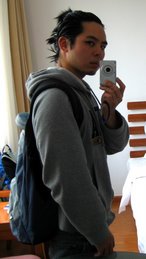Mistake #4: Where's my belt?!?
Danny and I left Hong Kong, the "Shopper's Paradise," three days ago. I picked up some real goodies there, including some great shirts from Espirit HK (which, unlike its American counterpart, carries a men's line, and very stylish apparel for both genders), and a belt from a store called Muji. Muji is a Japanese lifestyle store, and like all Japanese creations, is better experienced than described. I will, however, make an attempt with my phenomenal powers of
language to impart an idea of the wonder that is Muji. First, those familiar with Famima!! (yes, that pair of exclamation points is actually part of the name; I didn't add them out of zeal for the convenience store chain) will appreciate the following analogy:
Famima!! : 7-Eleven :: Muji : Urban Outfitters.
That is to say, Muji is like a yuppified, Japanesey version of Urban Outfitters, plus a host of items one wouldn't think belongs together with clothing. At the branch I visited (in Causeway Bay), the majority of the store was dedicated to clothing, but they also sell school supplies, furniture, household items, and food. "Food, clothing, and household items under one roof?" I know, I know. Call it crazy. Call it insanity. Call it Japanese. It's not just any sort of food either. There were things like dehydrated gourmet soups. Things like tomato bisque with bouquet garni—just add water! There was dried cuttlefish as a snack, and a variety of other very Asian foodstuffs. I don't remember the extent of the collection, but I recall it was very eclectic and not at all the sort of thing you'd expect to find sold at, say, the GAP, which is the closest store clothing-wise to which I can compare Muji.
So it was to my embarrassment and shame that after leaving our hotel in Guiyang (where we overnighted for three nights before returning to our small town in the Chinese countryside) I discovered that I had lost my belt!

Above: So impressed was I at how completely and unerringly the bellhop's uniform subscribed to the archetypal ideal of a bellhop's uniform, that I had to take a picture in one. After a little bit of negotiating, I was able to coax the hotel staff into letting me put on the hat and jacket for a photo opp. Danny acted embarrassed at my unusual request, but I know he longed to don the jacket, too.
Mistake #5: Whom are you calling a slave?
Whatever "embarrassment and shame" I may have felt at misplacing my belt was soon overshadowed by mistake number five.
This evening as soon as we got back home, I began searching for the hotel phone number. I met many difficulties along the way, mainly because we had used Elong (the Chinese affiliate of Expedia), which does not give out hotel contact information, probably for fear that customers could try to contact the hotel directly and negotiate an even cheaper deal. Many sites listed either the Chinese or English name of our hotel, but all were travel agencies unwilling to give my the phone number. Finally I found the actual hotel website (which one would assume would be the first item in a Google search, but one would be wrong). Here's a snippet of my conversation with the receptionist:
JT: 喂﹐你好。
Receptionist: 你好。
JT: 我刚刚离开你们的宾馆,可是我怕我丢我的腰带在你的宾馆。
R: 你会不会回来?
JT:不会。我...那个,那个,那个... 我—
R: 你说!你的中文不错。你要说什么?
JT: 对不起, 我的中文这么差。现在我已经回家了!那个那个...“丫头”可不可以去我的房间找一下我的腰带?
R: “丫头”?你的意思是“服务员”吗?
JT: 对对对对对!“服务员!”不好意思。服务员可不可以去我的房间找我的腰带?
R: 你的房号码多少?
JT:二三零九。
R: 二三零九, 好,请等一下...对不起,她们找不到。你明天晚上再打电话。
JT: OK, 好的。谢谢。
Translation:
JT: Hello?
Receptionist: Hello.
JT: I just left your hotel, but I'm afraid at your hotel I lost my belt.
R: Are you coming back?
JT: No. I, um, um, um...I—
R: Go ahead and speak! Your Chinese is not bad. What are you trying to say?
JT: Excuse me, my Chinese is inadequate. Right now I'm already home! Can the um...the um...can the "slave girl" go to my room to look for my belt?
R: "Slave girl"? You mean the maid?
JT: Yes, yes, yes, yes, yes! I'm so embarrassed...Can the maid go to my room to look for my belt?
R: What was your room number?
JT: 2309.
R: 2309, ok. Please hold a moment...I'm sorry, they couldn't find it. Call back tomorrow night.
JT: Okay, great. Thank you.
In Chinese there is no distinction between different types of service sector employees: "waiter," "waitress," "maid," "receptionist," "clerk," "bellhop," busboy, " &c. are all covered by the umbrella term "服务员," or "service person." [Incidentally, I think this explains why my friends in China refer to salespeople as "waiters." They're translating "服务员" from Chinese to English, but aren't aware that English has many sub-catergories of service people based on industry and exact nature of each job.] In a momentary lapse, I forgot this fact, and began searching my mental Chinese dictionary for the word "maid." Finding nothing, my teeming brain reverted to the default word, which apparently in this case is "slave girl," a fun term I picked up from watching Taiwanese soap operas. (I know it seems like a questionable method for learning new vocabulary, but I have found it a highly effective and wonderfully diverting technique for expanding my lexicon and improving my listening comprehension.) It was a little embarrassing, but at least it gave me something about which to write.
I'm a slaaaaaaaaaaaaave for you!


No comments:
Post a Comment